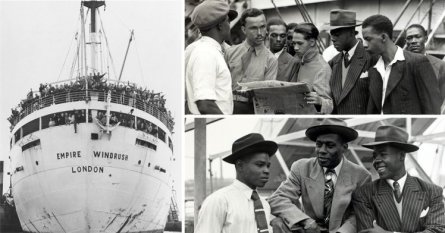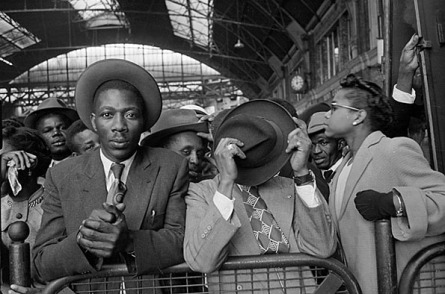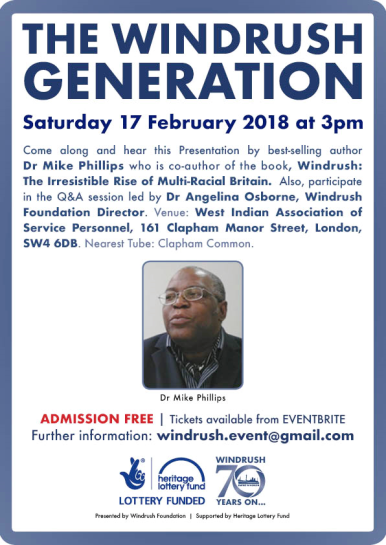Empire Windrush 70th Anniversary
Tuesday 22nd June 1948
The Arrival
The Empire Windrush's voyage from the Caribbean to Tilbury took place in 1948. Believe it or not, very few of the migrants intended to stay in Britain for more than a few years. If it hadn't been for the Second World War, the Windrush and her passengers might not have made the voyage at all. During the war, thousands of Caribbean men and women had been recruited to serve in the armed forces.
When the Windrush stopped in Jamaica to pick up servicemen who were on leave from their units, many of their former comrades decided to make the trip in order to rejoin the RAF. More adventurous spirits, mostly young men, who had heard about the voyage and simply fancied coming to see England, 'the mother country', doubled their numbers.
June 22nd 1948, the day that the Windrush discharged its passengers at Tilbury, has become an important landmark in the history of modern Britain; and the image of the Caribbeans filing off its gangplank has come to symbolise many of the changes which have taken place here. Caribbean migrants have become a vital part of British society and, in the process, transformed important aspects of British life.
In 1948, Britain was just beginning to recover from the ravages of war. Housing was a huge problem and stayed that way for the next two decades. There was plenty of work, but the Caribbeans first clashed with the natives over the issue of accommodation. But alongside the conflicts and the discrimination, another process was taking place.
Excluded from much of the social and economic life around them, they began to adjust the institutions they brought with them - the churches, and a co-operative method of saving called the 'pardner' system. At the same time, Caribbeans began to participate in institutions to which they did have access: trade unions, local councils, and professional and staff associations.
Identity
By the start of the seventies, West Indians were a familiar and established part of the British population, and they had achieved more than mere survival. One indication of their effect on British life is the Notting Hill Carnival. the carnival took place in the same streets where West Indians had been attacked and pursued by baying crowds, but it began as a celebration, a joyous all-inclusive testimony to the pleasure of being alive. As it developed, it became clear that here was a British festival where everyone was welcome, and everyone who wished to had a part to play.
Throughout the seventies, the children of the first wave of post-war Caribbean migrants began to develop a 'black culture' which is now part of a black British style shared by Africans, Asians and white young people alike.
The people of the Windrush, their children and grandchildren have played a vital role in creating a new concept of what it means to be British. To be British in the present day implies a person who might have their origins in Africa, the Caribbean, China, India, Greece, Turkey or anywhere else in the spectrum of nations.
The now-familiar debate about identity and citizenship was sparked off when the first Caribbeans stepped off the Windrush. Alongside that debate came the development of arguments about the regions within the United Kingdom - Scotland, Wales and Northern Ireland.
The British national self-image has been thoroughly remodelled in a very short time. Seen against the deadly agonies associated with ethnic conflicts in other European countries, Britain offers the example of a nation, which can live comfortably with a new and inclusive concept of citizenship. In a sense the journey of the Windrush has never ended.
Calendar of Events
| Date | Event |
|
Friday 22nd June 2018 from 12:00 to 13:00
|
Westminster Abbey London SW1P 3PA
Spirit of Windrush - Contributions to Multicultural Britain : A Service of Thanksgiving will take place in Westminster Abbey at Noon on Friday 22nd June 2018. The Service in the Abbey will be held to mark the 70th anniversary of the docking of the MV Empire Windrush, into Tilbury Docks, which brought more than 500 Caribbean men and women who responded to an invitation to come to a country in recovery from the Second World War and in need of help from British subjects who were also Commonwealth citizens. The service in Westminster Abbey will involve worship, music, carefully chosen words, lessons and prayers and will touch on the themes that are relevant and strident, namely the invitation, the recognising of struggle following the invitation and the creative, unique and significant contributions made by the citizens and their descendants since then.
To apply for up to FOUR free tickets online, click on REGISTER above. Having done so, on the right of the first screen, click on GENERAL ADMISSION, choose to apply for your tickets giving the information requested, then click on CHECKOUT on the next screen. A link to your ticket (s) will be sent to the email address that you enter and you can print them off ready for the day itself. Doors will open at 10.45 am and members of the congregation are requested to be seated by 11.45 am.
Please note that those attending will need to bring a form of photographic identification (such as a passport or driving licence) to match the name (s) printed on the ticket (s) in case they are asked to produce it for entry. Please keep baggage brought on the day to a minimum, and note that large baggage may not be able to be accepted for entry at the Abbey, so other arrangements separate to the Abbey should be made.
|
| Date | Event | |
|
Saturday 17th February 2018 from 15:00 to 17:00
|
West Indian Association of Service Personnel
You will need to register on Eventbrite to attend this event
|








